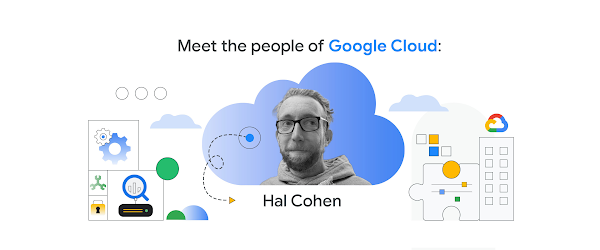Editor’s note: Hal Cohen’s work at Google Cloud calls for technical knowledge, customer empathy, business sense, and the ability to work with diverse groups of people inside and outside of Google. However, his personal and professional strengths come from much more than that. Read on.
Tell us about your work at Google Cloud.
First off: Being an organ donor is great. Do it.
I’ve been with Google for 10 years. At the beginning, I sold collaboration products, like Gmail, to businesses. Then I built one of the first dashboards at Google, which gathered insights into what customers were using, what they liked, and how we could improve. My role may have evolved since then, but I’m still interested in figuring out how customers use our products, what they like, and how we can do better.
You manage other technical account managers now. What advice do you give them?
It’s very much a job of blending things and seeing the big picture. People have to be technical, but they also have to know the product, understand the customer, and get good at asking the right questions about the culture of the organization. People should also be open to receiving honest feedback and hearing about things customers may not like. Finally, people need the resilience to make things better.
That last part sounds a little like your personal story.
It is. In 2000, during my first year of college, I was diagnosed with idiopathic glomerulonephritis, which means that my kidneys are becoming damaged over time, and may ultimately fail. Over the past 20 years, I’ve done two types of dialysis, had two kidney transplants (one from my brother and one from my dad), lots of immunotherapy, several hospital stays, and various alarming side effects from medications. Last April, I found out that there was a cancerous tumor on one of the kidneys—and oh yeah, and I got COVID-19, which needed to be treated with monoclonal antibody therapy. I would say I definitely have experience with hearing—and working through—bad news.
It’s always been important to me to keep living my life, keep having goals, and continue looking at the bigger picture. Despite my medical challenges, I still earned an honors degree in computer science, worked as a consultant, joined Google, received several promotions, got married, and had two kids. That’s the resilience part.
Do you ever wish your life was less troubled, more normal?
I have no idea what the concept of “normal” means. But I’m not sure anybody else does either, because everyone is working through something. While I do talk openly about my health history at work, I don’t overdo it. I don’t want people to feel like I’m afraid or ashamed of it, because it’s life. I find that after sharing my story, people are comfortable opening up to me about their health problems, mental health issues, cultural pressures, and more. There are all kinds of unique sources of pressure—whether at home or at work—and it helps to be open about them sometimes.
What helps when you get low?
I’m from Liverpool. It’s a place that’s seen some hard times, but the people there are always friendly, always joking. Even when we were stuck in the hospital over Christmas holidays, we’d manage a laugh. No one is out to “be inspiring,” they just get on with life. So yeah, I’d definitely recommend you be from Liverpool.
I also have a quote over my desk from John Wooden, the great UCLA basketball coach: “Things turn out best for the people who make the best of the way things turn out.” That quote really resonates with me, in my work and my personal life, because it doesn’t mean I have to always be upbeat, but I do have to move forward. One day last spring, I cried pretty much steadily for 24 hours—there’d been complications when removing the cancerous tumor, my wife had a serious illnesses, and I was feeling the weight from years of this struggle. So I decided I needed a break and I took three months off with lots of family vacations while recovering.
Anything else?
Learn how to ask for help. When you start a new job, set up one-on-one meetings with everybody. Build relationships and persevere. Focus on what you can control.
Did I mention organ donation? It’s a great thing and it saves lives. November 27, which is pretty close to Thanksgiving in the United States, is the anniversary of my brother giving me one of his kidneys—an act of selflessness that gave me 12 healthy years before things got tough again. I give thanks all the time, but this week is really special to me.
If you want to be an organ donor in the UK, register through the National Health Service website. In the U.S., donor registration is done by state, but organdonor.gov can steer you to your state’s registration. Wherever you are, you can likely find resources to register online.
Cloud BlogRead More


